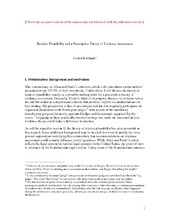Relative plausibility and a prescriptive theory of evidence assessment
Peer reviewed, Journal article
Accepted version
Permanent lenke
https://hdl.handle.net/1956/22104Utgivelsesdato
2019Metadata
Vis full innførselSamlinger
- Department of Philosophy [240]
Originalversjon
https://doi.org/10.1177/1365712718815013Sammendrag
While the theory of relative plausibility is presented by Allen and Pardo (2019) as a descriptive theory of the proof process, this commentary discusses their theory as a possible starting point for a prescriptive theory of evidence assessment. Generally, naturalness and simplicity are necessary for the success of such a theory. The theory of relative plausibility is very promising in this respect, as its key concept is the straightforward and intuitive notion of explanation, according to which an explanation is an answer to a “why” question. Still, both the explanatory and the comparative dimensions of relative plausibility are in need of elaboration if one wants to give advice on evidence assessment in terms of Allen and Pardo’s framework. For one thing, it is necessary to examine the epistemological status of the various explanatory criteria regarding their potential as guides to truth or likelihood. Only epistemic (i.e., truth-conductive) criteria should be included in recommendations to fact-finders. Moreover, given the author’s interpretation of the ‘beyond any reasonable doubt’ standard, it is unclear what the comparative dimension amounts to in criminal trials. At least a comparison of the kind involved in the author's account of civil trials standards is absent in their interpretation of BARD. If the comparative dimension of relative plausibility is relevant at all in criminal trials, it must be clarified what is to be compared.
